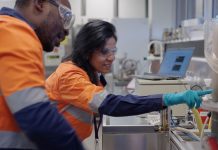THE resource industry’s peak national employer group the Australian Mines and Metals Association (AMMA), has labelled a recent Fair Work Australia (FWA) tribunal drug test ruling “inconsistent and conflicting”, warning that the decision could restrict employers from adequately managing drug and alcohol issues. The tribunal ruled that companies could only administer on-site drug and alcohol testing using oral swabs, despite urine tests proving more effective, and found that the use of urine testing was “unjust and unreasonable”.
Last month, electricity infrastructure company Endeavour Energy confirmed it had lodged an appeal against FWA’s ruling, saying “it was urine testing, not saliva-based drug testing, that best mitigated the foreseeable risks associated with chronic drug use”.
The AMMA has backed the appeal, saying that the outcome could determine whether employers in the resource industry would be restricted in their ability to administer appropriate on-site drug and alcohol testing procedures.
The AMMA also believes the Endeavour Energy ruling was contradictory to an earlier decision involving HWE Mining, where the tribunal stated that urine testing was more accurate and less likely to produce false negatives. “The resource industry is concerned with both the inconsistent and conflicting decisions coming off the tribunal, along with separate legislative proposals to restrict mining industry employers’ ability to introduce urine testing for drug detection,” AMMA chief executive officer Steve Knott said. “The contradictory decisions are not helping employers gain confidence in their ability to properly manage drug and alcohol issues, particularly when the experts have shown saliva testing is more likely to produce false negatives, meaning some workers significantly impaired under the influence of drugs will not be detected.” AMMA-commissioned research into the efficacy of saliva and urine testing revealed that only urine tests reliably
detected extreme ‘hangover effects’ of drugs.
The research also concluded that oral fluid tests were far more likely to produce false negatives and saliva testing was more vulnerable to ‘masking’ techniques to prevent detection.
Mr Knott said employers were dedicated to meeting workplace health and safety obligations but their capacity to operate their businesses and maintain a safe work environment was being undermined by a separate union agenda.
“If the findings in the Endeavour Energy case are upheld on appeal it will severely undermine employers’ ability to implement the drug and alcohol system of their choice, and strengthen the union push against on-site urine testing,” he said.
Mr Knott said three of the country’s key resource states – Queensland, WA and NSW – now had the opportunity to properly weigh up the pros and cons of these proposals and involve key stakeholders in the consultative process. “There is still time to maximise the benefits of a national OHS system without placing these unnecessary restrictions on resource industry employers,” he said.
By Helena Bogle






















